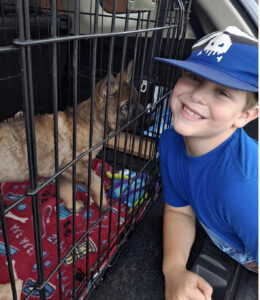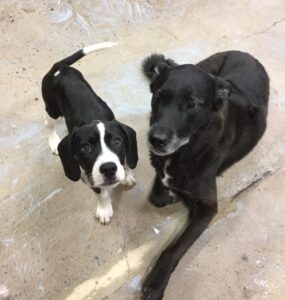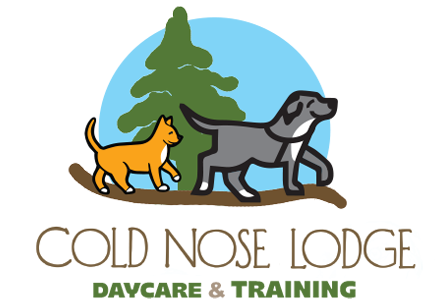Puppies & the Pandemic
“Unprecedented Times”
BY Angelina Worman CPDT-KA
I hear that a lot lately and it is definitely true. One thing I have noticed is that some things are still the same. Thankfully. The dogs need to be walked. The puppy needs to be house trained. The puppy needs training and socialization. But how do we go about it safely in these “Unprecedented times”?
Experiences
When it comes to puppies or dogs in general socialization is a fancy word for experiences. This is true for dogs of all ages but crucial for puppies 8 weeks into adolescence (18 months of age). Exposure to positive experiences and even mildly stressful situations mold your puppy/dog into who they will be in adulthood. Some experiences can be fun, exciting, scary and even overwhelming. So it is important to be aware of your puppy’s reaction, specifically their body language when they’re experiencing things.
Body language is dog language.
They “say” a lot to each other and us with their bodies. Common signs of trying to calm oneself or another being are:


Pandemic Puppy Luther with his new boy Jase
- Yawning
- Lip kicking
- Sitting
- Scratching
- Whale eye (diverting eye contact)
- Turning the head or body away from someone or something
- Full body shake off (like when a dog is wet but in this instance they are not)
- Walking away
Dogs will display these signals when they are trying to calm themselves or someone or something else
What Do I with This Info?

It can be a lot to think about, I get that. But the more you know the better it will be for you and your pup.

Pandemic Puppy Trace with big sis Scout
1. Stop! If you and your puppy are out and about and your pup shows some of the signals above STOP! and assess the environment. What is she concerned about? Stand still and let her watch. Speak sweetly. Say something like “oh look a trash can.”
2. Do Not Force Interactions The worst thing you can do is drag the puppy to the scary thing, person, or animal. Instead, allow her to look and sniff. Now you take a step toward the trash can. Be sure not to put any tension on the leash. You want it to be her choice. If she takes a step forward, quietly encourage her. If she only takes one step and decides to walk away, allow her to do so. She is not ready to explore the trash can yet. That is ok. You can revisit this again later or tomorrow. We want her experiences to be positive ones. This builds confidence and a better adjusted dog. If she decides to go to the trash can and investigate calmly but sweetly praise her. Now is not the time to party! You may scare her and then she may associate that sudden fear with the trash can.
3. Find a Positive Reinforcement Trainer This is a step you do not want to gloss over. Do your research. Visit the facility and meet the trainer.
Ask questions like:
What do you do if a puppy or dog does something inappropriate? (You want to avoid a trainer that is going to use physical punishment.)
What is your training style?
What are your training credentials?
Trust your gut. If you feel something isn’t right, you’re likely right. Make sure they require vaccine records. Take note to the cleanliness of the facility. Also, note how the staff interacts with your dog and you of course!
We at Cold Nose Lodge pride ourselves in providing a safe, clean and positively fun environment for your furry family members.

Puppy Kindergarten graduation
Please check out our upcoming classes and join us on your pup’s training journey to adulthood! We can help you through this puppy pandemic with safety and your pup’s training needs in mind. www.coldnoselodge.com/info/training-classes
